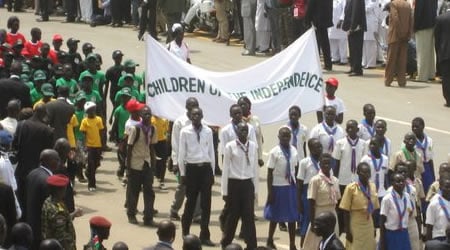|
Newly Independent South Sudan Looks To Future, Permanent Constitution

Children march in the independence day parade in Juba
South Sudan became the world's newest country on July 9 after a January referendum that showed overwhelming support for independence. Richard Nuccio, NDI's senior director in the new country's capital, Juba, was invited to the independence festivities and captured the celebration in photos. "It was an amazing moment and I felt very privileged to be a part of it," he said later during an interview on WPFW's Africa Now!
South Sudan adopted a transitional constitution just before independence and will soon set about crafting a permanent one. NDI will work with a coalition of women's civic groups from throughout the country to submit recommendations for the new document. The coalition wants to be sure that gender quotas for all branches and levels of government are a part of the constitution and that full separation of powers is addressed.
In March and April, NDI conducted the latest in a series of focus groups it has been organizing since 2004. This latest round explored South Sudanese attitudes toward independence and the future of their new country. “What we heard in the past was a focus on separation,” said Traci Cook, researcher and author of the upcoming report. “We found that they are now turning the corner and beginning to look internally.” Participants saw themselves as South Sudanese first and foremost, and want to move past tribal discrimination and corruption in the new government.
|
|
NDI President Wollack Reflects on Returning to Burma after 16 Years
In June, NDI President Kenneth Wollack traveled to Burma to meet with Nobel Peace Prize Laureate Aung San Suu Kyi and other leaders. Wollack reports that little in the country has changed since his last visit, but that Suu Kyi remains the unflappable and optimistic leader he met in 1995. Read more»
Aswat Community Connects Activists in the Middle East and North Africa
The Arab Spring uprisings have underscored the impact that social media can have on advancing democracy. As early as 2005, NDI recognized social media's potential and launched Aswat, an online community for those in the Middle East and North Africa looking to make governments more responsive, transparent and effective. Now, recognizing the additional responsibilities and challenges facing citizen reporters, Aswat is training them on journalistic ethics and professional standards. Read more»
Civic Group Invites Nicaraguan Citizens to Participate in Election Monitoring
A new website launched by the Nicaraguan group Ethics and Transparency allows citizens to report any electoral problems that might compromise the November national elections. Read more»
New Report: Political Parties in Afghanistan
Based on 90 interviews with party representatives and civil society, this new report explores how Afghan political parties view themselves, what kinds of assistance would serve them best and ways they might work together in the future. Parties see themselves primarily as supporting individual candidates, rather than an ideology, and focus their activities on elections instead of planning party strengthening activities between polls. The review also revealed that Afghan parties are highly interested in modernizing their internal structures and promoting cross-party cooperation. Read more»
|
|
Opinion Research Shows Tunisians Concerned About the Future
Six months into their political transition, Tunisians are concerned about high levels of unemployment, according to the latest round of focus group research conducted by NDI. Tunisians are also concerned about personal security, but are more optimistic about gains in freedoms of expression and association. Read more»
New Library Helps Liberian MPs Write Legislation
A new library and research service in the Liberian parliament is helping lawmakers write legislation. Among them is Senator Gloria Musu Scott, who wanted to draft a bill providing domestic partnership benefits for those in common law marriages. So she visited Liberia's new Legislative Information Service (LIS) to find how other countries have handled the issue and conducted an Internet search that turned up similar laws in several U.S. states. This type of information would not have been available until the library opened a few months ago. Read more»
Mauritanian Parliament Seeks Citizen Input for Social Security Reform
Social security is a hotly debated topic in Mauritania. The current system is expensive, and the government is facing choices on whether to raise taxes, cut services or restructure the program. Rather than operating behind closed doors, the parliament has sought citizen input, holding a public meeting and asking leaders from civil society organizations to weigh in with their policy ideas. Read more»
As Mauritanians prepare for parliamentary and municipal elections tentatively scheduled for the fall, keep up with the latest political analysis and developments by subscribing to the Mauritania Elections Bulletin. Subscribe»
|

